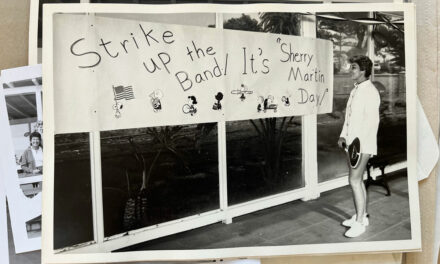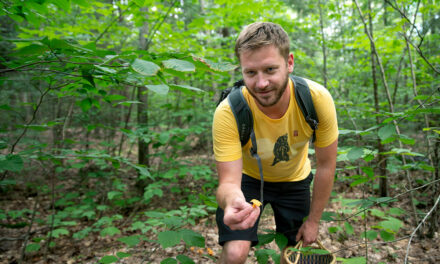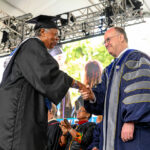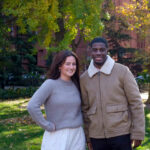
A Continuum of Support
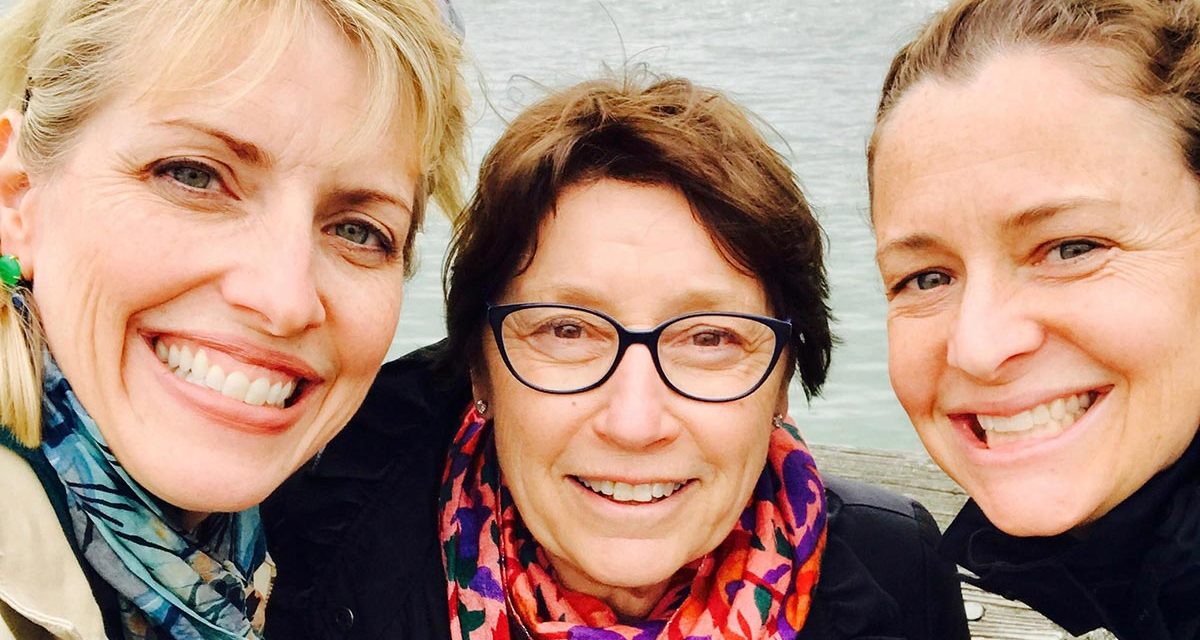
A Continuum of Support
BY SUSIE ZIMMERMANN
Together for 17 years at SSSAS, a trio of counselors provides the entire community with the care, nurturing, and strength to grow and succeed through any challenge.
Every school morning, Director of Counseling and Lower School Counselor Susan DeLaurentis—or Ms. D as the children call her—stands on the corner by Lloyd House directing traffic and greeting Saints: parents, children, and dogs. An animal lover, Susan lines her pockets with dog treats so she can connect with each of her canine customers, as they walk past her carpool post.
“I have about 18 customers who come every morning for treats,” explains Susan. “It’s helped me to have a closer connection with parents and gives me a lot of joy, which has been especially great this year. And I know that I better not run out before Clyde shows up!”
Susan has greeted nearly three generations of Saints at SSSAS. For more than half of that time, she has worked alongside the school’s two other mental health counselors, Karen Kunz in the Middle School and Susannah Harrison in the Upper School, to support the wellbeing and development of the entire community.
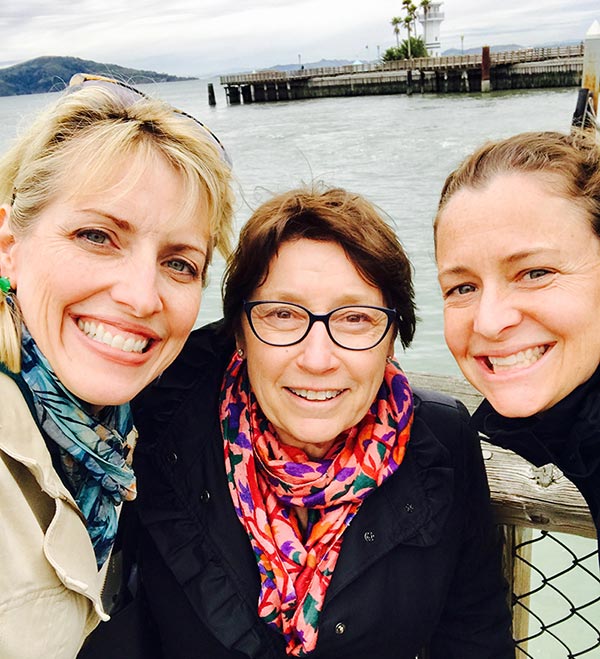
Susannah Harrison (Upper School), Susan DeLaurentis (Lower School), Karen Kunz (Middle School)
Counseling one-on-one as well as delivering a variety of programs throughout the year, Susan, Karen, and Susannah work with every Saint to ensure that their emotional growth is as strong as their academic progress.
Their longevity as a group has made them the longest-serving counseling trio at any independent school in the area. They attribute this success to their camaraderie and respect as a team and the unique affection and skill each brings to their assigned division.
Lunch Bunch, Dog Treats, and Walks Around Campus
Reflecting on the last year, Susan has nothing but praise for how the Lower School students and faculty have handled every challenge that’s come their way. “Everyone’s been amazing. With classes in tents and P.E., snack, and lunch outside, the kids have been so adaptable. Teachers have been schlepping supplies outside and staying out there all day while finding ways to make class time engaging and enriching. Everyone has done what they had to do, and I have the utmost respect for them,” she says.
When the students first returned to campus, that transition was a challenge. “Simply being in school all day was a tiring change for these kids after months at home,” she recalls. And yet, Susan credits the children and faculty with quickly and flexibly adapting: not complaining, demonstrating self-reliance, looking for ways to make things better, trying new things, and dealing with disappointments. “COVID has given children a real opportunity to show their resilience and adaptability,” she says. Perhaps they’ve also learned about a positive attitude from Ms. D herself. “The biggest lesson is that we can manage.”
One unfortunate change due to the pandemic is the pause of her popular Lunch Bunch program with students in grades 3-5. Usually held in the basement of Lloyd House, these small informal groups form at the beginning of the school year to help new students adjust to the school culture, and over the course of the year students may come in and out of Lunch Bunch or join another group. Years after they leave the Lower School, older students often reminisce with Ms. D about Lunch Bunch.
Susan earned an undergraduate degree in early childhood education and taught pre-K before returning to school for a master’s in counseling. “I wanted to help students and parents go beyond identifying a problem and work with them to address it,” she says. She came to SSSAS in 1993 in a part-time role, and became a full-time counselor just a few months later.
After nearly three decades of counseling, Susan has noted the different challenges that parents have faced over the years. She thinks the greatest issue for children today is increasing anxiety from exposure to too much information and news.
“Kids are growing up a lot faster,” she says. “They start with cell phones at such a young age now. It’s easy for them to make mistakes and not use good judgment, especially with social media, and those missteps stay with a kid far longer than anyone would like. Things you post can remain accessible forever.” She reminds parents to set strict boundaries at home when children are young and willing, usually, to comply.
At school, Susan believes in the importance of being visible, approachable, and accessible. “It’s how I do most of my work,” she says. “I’m rarely sitting in my office unless I’m meeting with someone.”
Along with her work with children, Susan provides support to the Lower School faculty, for whom she has the highest admiration for how they have managed every challenge they have faced during the pandemic. From overcoming the one-dimensional limitations of online teaching that can dilute teacher personality and student attention to having parents in their classes, teachers also lost the opportunity to check-in individually with students during class time. “Our teachers are so good at that, walking up to a desk and quietly touching someone’s shoulder to see if they need a bit of one-on-one help” Susan says.
As students returned to campus, teachers faced other challenges reestablishing norms and regaining student attention while adhering to social distancing requirements, but Susan applauds their ability for maintaining excellent teaching standards.
In terms of immediate impacts, Susan equates the COVID pandemic to the shock and disruption of September 11, but notes that the duration of the pandemic has made it more wearing. Still, the resiliency of young children heartens her and she credits it with fueling the faculty and administration to move forward.
Susan also appreciates the school’s Episcopal foundation for valuing emotional well-being alongside academics. “There’s always been a focus on justice, compassion, and goodness in our mission statement,” she says, “and placing equal importance on goodness as well as knowledge.”
Lower School Director Jalene Spain Thomas credits Susan for making the division “whole each day with her nurturing presence, supporting each community members’ needs and offering her undivided attention. Students light up in her presence because of the authenticity she brings to each interaction, from the sincere enthusiasm for a child who has lost a tooth to the unwavering care she gives to a child grieving the loss of a pet. Colleagues and parents relish her insight and wisdom on topics big and small. She is a tireless advocate for the preservation of childhood and respecting student agency and voice.”
With both of her own children now grown, Susan spends her free time taking long walks with her dog, reading, and puttering around the house and garden. “I like to be outside, and I love the Lower School campus,” she says.
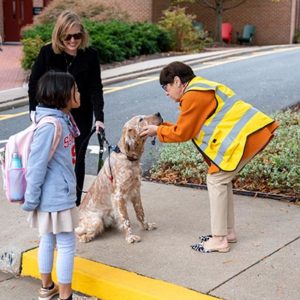
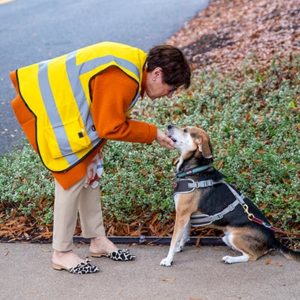
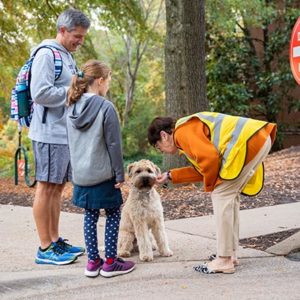
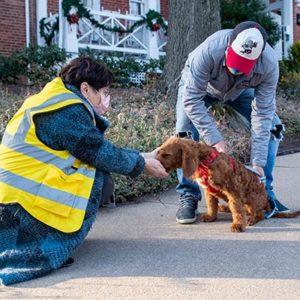
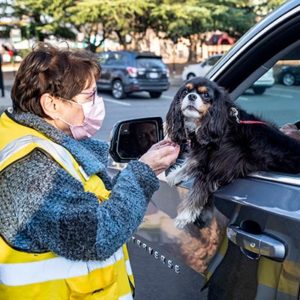
The Glory of Adolescence
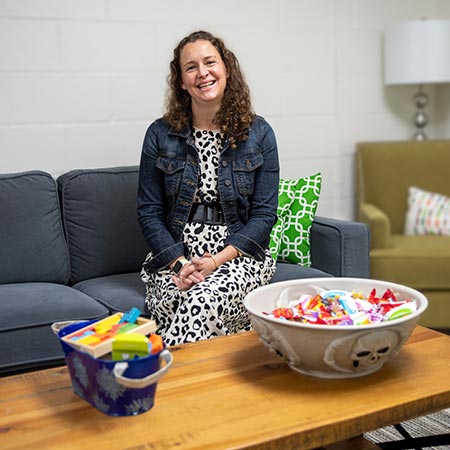
Middle School Counselor Karen Kunz
For every comment about the challenges of the Middle School years, Counselor Karen Kunz sees a positive. “Middle Schoolers have the highest highs and the lowest lows,” she explains. “Their impulsive natures lead to amazing ideas. They think outside the box and are really creative. When they say ‘that’s not fair!’ they demonstrate a beautiful commitment to social justice.”
Karen loves watching her students’ dramatic growth in the three years from sixth to eighth grade. “By the time they head to the Upper School, they’ve developed so much, and are capable, smart, and managing complicated thoughts. They have learned to navigate many firsts, and experienced the feeling of something terrible happening in a day and realizing that everything passes. They gain insight and grow from it, and we give them space to do that and to feel safe taking risks.”
While some children may have had a difficult transition returning to campus during the pandemic, Karen believes most were ready and happy to return. “Just when this age group is supposed to begin separating from their parents,” she explains, “they were instead required to stay at home more than ever. That wasn’t easy for them, or their parents.”
Add to that the challenge of distance learning and a schedule shift to longer-than-usual 75-minute classes, the students faced tests of patience and focus. Teachers have to keep students motivated, and students with learning and executive functions faced even greater hurdles. “Overall, everyone managed and was so incredibly resilient,” says Karen. Perhaps the greater challenge was navigating an online social experience in which students were in cohorts of small groups and could not see all of their friends.
Once everyone was back on campus, even with the ongoing social distancing, Karen is proud of how everyone has taken it in stride. “And now we can see the light at the end of the tunnel,” she says. “I’m looking forward to hopefully having some normalcy in the fall.”
Karen traces her path to counseling to her parents who both worked in pediatric healthcare. “Dinner table conversations often revolved around the health issues they were handling each day,” Karen recalls. “I didn’t think I could regularly process such serious physical illnesses, so I gravitated toward mental health.” A psychology major in college, Karen first worked in Brookline, Mass., in a residential center for children with traumatic brain injuries and mental health needs. She returned to school to earn her master’s in counseling and came to SSSAS in 2004.
Over the years, Karen has watched with trepidation the rise in social media. Citing some strengths of it—“Obviously with COVID it’s provided a critical way for kids to stay connected”—but the access it provides coupled with the undeveloped adolescent brain trying to process everything can be a very tough combination and often lead to anxiety and depression.
Karen wonders if the growth in adolescent anxiety and depression symbolizes more actual cases, greater skill among professionals in diagnosing, or heightened awareness and comfort in this age group to talk about it. Whatever the source, when intervention can happen at these younger ages the long-term success rate for treatment increases, and often before “it counts” with more serious life situations. Across the divisions, Karen and her colleagues feel more knowledgeable and adept at handling these issues. “I’m proud of how we’re making space for kids to be healthy physically, emotionally, and academically.”
Karen shares her love for Middle Schoolers with the entire Middle School faculty, with whom she appreciates an easy camaraderie. Her door is open to informal chats and pop-ins from teachers and students. “Sixth graders typically will come talk to me more readily than seventh and eighth graders. Word of mouth helps, as kids tell other kids that this is a safe place to come and talk.”
“Karen is the person to whom we turn for care and counsel, compassion and courage,” says Director of Middle School Quincey Grieve. “Her laugh lights up the building in moments of joy, and she is our rock when we face hardship. She knows and adores all of our students, and she is there for them, and their families, always. She wades through mud, literally, on overnight bonding trips; she teaches our children the power of self-restraint, as they learn to take one, just one, impeccable piece of candy from her on Fridays. Our health and well-being is Karen’s highest priority, and for that we are deeply grateful.”
After 17 years, Karen still enjoys the variability of every day. “The unpredictability is interesting and makes the days zoom by. There are always new and interesting things to talk about and new people to connect with.”
Juggling Independence, Pressure, and Looming Adulthood
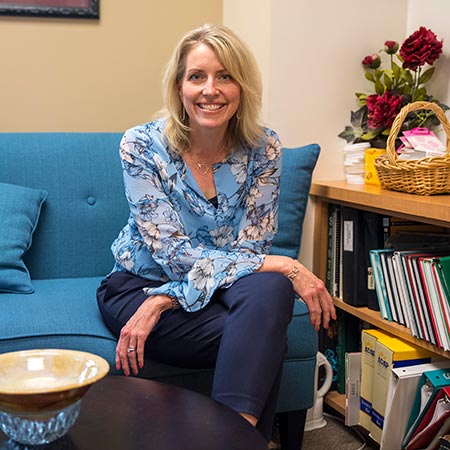
Upper School Counselor Susannah Harrison
Students in the Upper School were the last group to return to campus full time from the pandemic, and Upper School Counselor Susannah Harrison could not have been happier to see them. She acknowledges, however, that for some students the return was a difficult transition. “The extroverts are thrilled to be back in any capacity,” she says, but for others who thrived in the online learning program and did not miss the social aspects, it’s been a bit harder.”
Susannah describes some of her Upper School Saints before COVID as overscheduled and often pressured to do everything they can to get into their college of choice. COVID offered an unexpected and welcome break. “It forced many of these kids to slow down a bit,” she says. “It was good for them to be able to assess what’s important, relax and read, and even practice mindfulness, which they typically don’t have time for.” As the students returned to a more normal life of classes and activities, they had a new appreciation for school and their friends, even while having to be patient with the ongoing COVID restrictions. Susannah joins the students in looking forward to a return to all of the school traditions, like Homecoming and the Sleepy Thompson Basketball Tournament in the fall.
Susannah’s interest in counseling was sparked while growing up in Atlanta. “I admired my sixth grade teacher who decided to go back to school and became my Upper School counselor,” she recalls. She earned a master’s in school counseling at Boston College—in the same program that Karen attended two years later—and returned to Atlanta to serve as a counselor in an independent school before moving to the D.C. area for her husband’s job. She started at SSSAS in 2004, very soon after Karen arrived.
Like her colleagues, Susannah has noted an increase in the level of anxiety, depression, and stress in her students over the years. At the Upper School level, she attributes this both to social media and technology as well as a rise in expectations for students.
The pressure to get into the college of their choice is intense for students, who find themselves competing for grades, filling their schedules with activities, and driven to excel at it all. Susannah reminds students that there are many paths to get where you want to go, and encourages them to consider the less obvious paths as a means of lessening the pressure.
Couple this pressure with the “living out loud” demands of social media, and teenagers have immense challenges. “It’s hard enough to develop and maintain relationships during the Upper School years,” she says, “and even harder when there are so many ways for people to be unkind. Will someone make fun of you for a post, will you put something up and no one will like it, will you be left out of a group chat?” Social media compounds the potential to feel isolated and anxious about the social experience, yet few kids will just opt out of it.
Rather than arguing about the merits of technology overall, Susannah encourages students to set time limits late at night for their use of technology so they can get more sleep. Reasoning like that is one of the things she likes best about working with Upper School students, “even if I don’t always succeed,” she says with a laugh.
One aspect of school that has not changed during Susannah’s tenure is high school social dynamics. “Figuring out who you are, who your people are, and how you’re going to make decisions about things like relationships and substances—this can be all-consuming at a time when the students are facing heightened academic pressure.” Susannah places a high priority on being available and ready to talk to students whenever they need it. “We also work hard to encourage kids to speak from ‘my’ perspective and to be kind rather than judgmental.”
That effort comes in partnership with “the stellar faculty, whom I love working with,” says Susannah. The school’s focus on community and making every student feel seen and known reinforces her work every day. “No institution is perfect and this may not be the school for everyone, but so many kids are genuinely happy to be here.”
Topics of diversity, equity, and inclusion have long been at the forefront, but the events of the past year have enabled Susannah and the faculty to approach them more assertively than ever before. Advisory periods provide extended time to delve further into these issues. “I think the kids have enjoyed having a space to talk about it,” she says.
When asked how she manages her own stress, Susannah laughed. Between the pandemic, recent spinal surgery, and raising three teenagers at home, her days are hardly relaxing. The return to campus after working from home was a welcome change. “I appreciate that there are some advantages of working at home, but I prefer a separation between my work and home lives,” she says.
Upper School Director Michael Mallett applauds Susannah’s commitment to her charges and how she supports everyone in the community. “From the one-on-ones with each new student in the fall, to the Peer Leadership program, and the local and national experts she recruits to speak to our community on adolescent and teen mental health topics,” he says, “we are, indeed, lucky to have Susannah on our team.”
Counselor Wisdom
Don’t Watch the News
Decades ago, Americans gathered virtually every evening to watch TV news programs and catch up on the world’s events of the day. Today, the news cycle is continuous and the number of channels and avenues are seemingly infinite and available through our phones and computers anytime. Given this access and the pace and depth of news, the best prescription to lessen anxiety is to turn it off. “Don’t watch the news,” advises Susan DeLaurentis, Director of Counseling and Lower School Counselor. “It’s just too much” for adults and for children of all ages.
Their Job is to Separate and Pull Away
Parents of adolescents and teens often mourn the behavior of their children defying their authority and trying out their independence, but Middle School Counselor Karen Kunz reminds parents that this is all very normal. “It’s their job to separate from their parents.” So, while it can be maddening and difficult, it’s not usually representative of any bigger problem.
Look for Signs of Depression
Whether we are better at diagnosing depression or more open to accepting it, cases of depression and anxiety are increasing among adolescents and teens. Fortunately, the stigma is lessened as well, and kids are more comfortable talking about it. Sometimes, though, symptoms can be confusing. Karen reminds parents that angst and irritability is a common behavior among adolescents and teens, but can also be signs of depression, so she urges parents to not discount such behavior if it lasts longer than usual. To drive home this message, Karen is talking to her students at younger ages about the signs of depression and how to address mental health.
Connect Screen Time with Lack of Sleep
Managing screen time for kids and adults may be one of the most universal challenges in our society today. The lure of connection and news of any kind, available at our fingertips 24/7, is both too tempting to avoid and yet can compound stress, anxiety, and exhaustion among everyone. Our Upper School Counselor knows that managing screen time, or setting limits for children, is easy to say and hard to do.
Instead, she suggests that parents connect lack of sleep with too much screen time. Teenagers need more sleep than they get, and helping them to see the value in limiting screen time at night to get more sleep may be a logic that teens can follow.
Many Paths to Get Where you Want to Go
Upper School students face a tremendous amount of pressure as they gear up for college. Juggling schedules full of academics and activities, sports and friends, and more, is a well-known recipe for stress and anxiety as they seek to get to that dream school or career. Susannah reminds families that there are many paths to get where you want to go. “It might not be the obvious path,” she says. “Maybe you can transfer into your dream school if you can’t get in straight from high school. Maybe you need to take a few detours along the way. But if you want to get there, you can. Just be patient and open your eyes to forging other paths.”
Looking Ahead
Susan, Karen, and Susannah are all breathing sighs of relief as the end of the school year approaches. Everyone eagerly anticipates the end of each school-year, but this year has been particularly challenging and remarkable. Still, the counselors have nothing but praise for how the entire community has handled every challenge and lessons of strength, resiliency, caring, and patience abound.
The counselors will next look ahead to the fall and, hopefully, a return of the pre-pandemic cycles, traditions, and hurdles of Saints life. From lunch bunches resuming in the basement of Lloyd House, to “normal” complaints about social life and over-the-top prom or Homecoming proposals, and even more serious mental health issues, we can all be grateful for the steady, calming influence and wisdom of these remarkable counselors…and know that when the next serious crisis comes along, the Saints community will be ready and able to handle it with the strength of this team supporting them.
When the average length of tenure for employees at any job is less than five years, to what do our counselors attribute their 17 years together at SSSAS?
“We have very different styles, are different ages and in different stages of our lives, but we just click,” says Susan. “There’s a generosity among the three of us. We’re always willing to help each other.” Susannah and Karen agree, and both value the mentorship Susan has provided them. “Susan and Karen are like my family,” says Susannah. “They give me what I need to weather any storm.”
“I’ve married and had both of my children during my time here,” says Karen, “covering all the major milestones of my adult life so far, with Susan and Susannah by my side.”
Each counselor is well-suited to the ages and divisions they support. “We are all in the place where we feel most comfortable, most knowledgeable, and do the best work,” says Susan. Karen agrees, saying “Susan is an expert in the Lower School, Susannah is amazing in the Upper School, and we complement each other and are each just where we should be.”
As a counseling team, the trio provides a continuum of care for students, and the institutional knowledge of the kids as they advance through the divisions and grow.
“Susan really primes them in Lower School with lunch bunch and counselor check-ins,” says Karen. “She’s normalized interactions with the kids so when they get to me they know what I do and are comfortable coming to talk with me.”
And even when students move on to the next division, the counselors have no ego about who students talk to if they need support. “If a student would rather talk to Susan or Susannah, I don’t take it personally,” says Karen. “It’s more important that every student feels cared for, has someone they are comfortable to talk with, and gets what they need as early as possible. We all want them to stay on a successful trajectory.”
The trio leans inward to help each other out, express concerns, and seek help. “Ours is a 100% supportive relationship where we can be easily vulnerable and share and grow together,” says Karen. “It’s always a highlight of my week to get together with Susannah and Susan to decompress, work through challenges we face, and just enjoy their friendship.”
The counselors also credit the School administration for their success. With no added responsibilities to their roles—such as teaching or coaching or scheduling—the counselors are able to focus on their work.
The team has also been working with an outside psychologist, Dr. David Flohr, for nearly the entire time they have been together. They meet with him weekly—in person, ideally, or during COVID by Zoom—to discuss difficult cases and how to best handle them. “It’s been a great gift for him to supervise us,” says Susan. The group looks forward to being able to resume their weekly car rides to Dr. Flohr’s office, valuable time together off-campus to be together.
Finally, the women appreciate the sense of community at SSSAS, for the support it provides the students and the culture it creates for everyone to work within. Each counselor emphasizes with their students the importance of getting to know each other, appreciating differences, and treating each other with kindness. “Plus, the students see how much the adults on campus like working here and like each other,” says Karen. “That adds to the warmth we all experience.”
Each of the counselors dedicates time to get to know students individually. As Susannah explains, “we want students to feel heard and appreciate that this is their school and they have a place here.”
Saints Support Programming
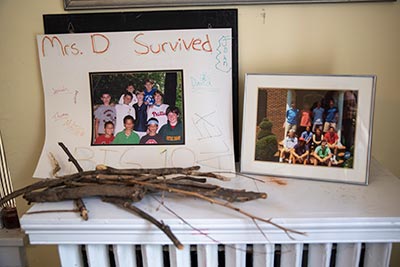 A day in the life of each of our counselors is a busy one, and the breakdown will vary day to day, from one counselor to the next. But each juggles a full load of one-on-one meetings with students and faculty, drop-ins and hallway chats, planning and preparation, administrative and faculty team meetings, and parent conversations. In addition, Susan, Karen, and Susannah coordinate group events and programming for students and parents throughout the year, including:
A day in the life of each of our counselors is a busy one, and the breakdown will vary day to day, from one counselor to the next. But each juggles a full load of one-on-one meetings with students and faculty, drop-ins and hallway chats, planning and preparation, administrative and faculty team meetings, and parent conversations. In addition, Susan, Karen, and Susannah coordinate group events and programming for students and parents throughout the year, including:
Lower School
Susan’s lunch bunch is an SSSAS tradition that has successfully connected the youngest Saints for decades. Some groups are single gender and some are co-ed, and all begin at the start of the year to help students adjust to school life and then continue throughout the year. Susan facilitates easy conversation during lunch bunch, checking-in with students, asking them to rate their day or week, and engaging in a wide variety of conversational topics. While lunch bunch didn’t meet this year due to COVID, Susan looks forward to being back together in the fall.
Middle School
Karen also manages lunch bunch groups, open to all students who choose to participate for informal conversation. While she’s held a few lunch bunch sessions over Zoom this year, most kids prefer to meet in person so she hopes to have them resume in the fall.
In addition, Karen organizes the weekly Saints Advisory Program that covers topics such as empathy, inclusion, and belonging and digital citizenship. For parents, Karen offers parent education programs throughout the year, including on Zoom this year.
Upper School
Susannah manages a full slate of programming. Seniors in Peer Leadership provide orientation and mentoring to freshmen throughout the school year. Other activities address the wide array of topics of import to students, including the One Love workshop, a college transition workshop, and a monthly senior girls’ lunch.
Susan’s office is filled with mementos, toys, books, photos, and sticks. The sticks have been collected from some playground adventurers who thought they made great weapons, all in good fun, of course.
The two photos were presented to her by one of her lunch bunch groups, made up of 10 boys from the Class of 2016. They gave her the photo on the left when they moved on to Middle School. It is signed by them all and says, “Mrs. D. Survived—Big 10.” Susan looks at the photo with a smile and says, “They were high spirited…really high spirited!” The photo on the right is of the Big 10 having a reunion just before graduation, lunch bunch friends for life.

